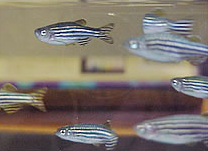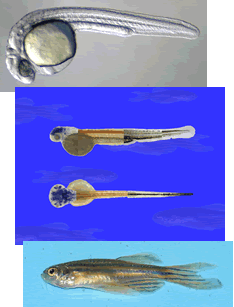Of fish and Chinese medicine
Based on her work in aquatic toxicology, CityU biologist Dr Shuk Han Cheng, Associate Professor in the Department of Biology and Chemistry, has developed a system to test Traditional Chinese Medicine (TCM). Dr Cheng is employing zebrafish embryos to identify herbs that can induce or inhibit the formation of new blood vessels. The project, “Screening Agents for Angiogenic Modulating Activities Using Teleosts Embryos”, has been granted HK$2.5 million under the Innovation and Technology Support Programme of Hong Kong’s Innovation and Technology Fund (ITF).
Over the past two years, Dr Cheng has been working with CityU computer scientist Professor Horace Ip, Chair Professor of the Department of Computer Science and co-investigator of this ITF project. They developed software that can reconstruct and measure the three-dimensional network of blood vessels in the tiny transparent fish embryos. With this imaging software, Dr Cheng can easily trace any changes in the complexity of the blood vessel network. “We have been applying this technique to study the toxicity of environmental pollutants. TCM is my first attempt to adapt this test system in other research directions,” she said.
With common ailments such as cardiovascular diseases and cancer, the formation of blood vessels has been proved to be a critical factor in treatment. For example, if scientists can find ways to promote the formation of new blood vessels to bypass the blocked ones, they have a better chance of helping a stroke patient. On the other hand, it is not easy for a cancerous tumor to grow without nutrients brought by new blood vessels. “If we can identify herbs that can enhance or inhibit the formation of blood vessels, we will be able to provide leads in developing new therapeutics for such diseases,” Dr Cheng noted.
When Dr Cheng joined CityU in 1997, she began to employ zebrafish embryo for research purposes. “Zebrafish is a model organism for studying how organs are formed in developmental biology, which is my major research interest,” Dr Cheng explained. “The zebrafish,” she added, “is recognized by the US National Institutes of Health as a model organism for biomedical research. We choose a fish that is used worldwide by other researchers, so that the results are comparable.”
Dr Cheng turned to TCM with good reason. There are hundreds of Chinese herbs and compounds that are widely used in treating cardiovascular ailments. “It’s an area that has not been fully exploited. Being able to read traditional Chinese medical texts,” she said, “we should take advantage of our cross-cultural heritage and strive for international recognition in this area.”
Dr Cheng will start her ITF research project in July. With the two-year funding, she plans to expand her aquaculture facility, scale up the prototypic assay system, optimize imaging capacity and make their bioinformatics system more user friendly by improving their software. She also plans to buy up to 10,000 zebrafish from pet shops in Hong Kong’s famous “Goldfish Street” to provide enough embryos to be used in screening for activities in the 100 herbs and 1,000 chemicals that she has planned to test for the project. “What we are doing is only the first step in drug development,” Dr Cheng said. “Once we have the data, perhaps other scientists can pick up the information and test it out on animals or even human beings.”After graduating from The University of Hong Kong, Dr Cheng was awarded her PhD from the University of London’s Royal Postgraduate Medical School. She received her postdoctoral training at the Ontario Cancer Institute, University of Toronto. Her current research interests in aquatic toxicology include gene expression analysis and developmental toxicity in zebrafish embryos.

